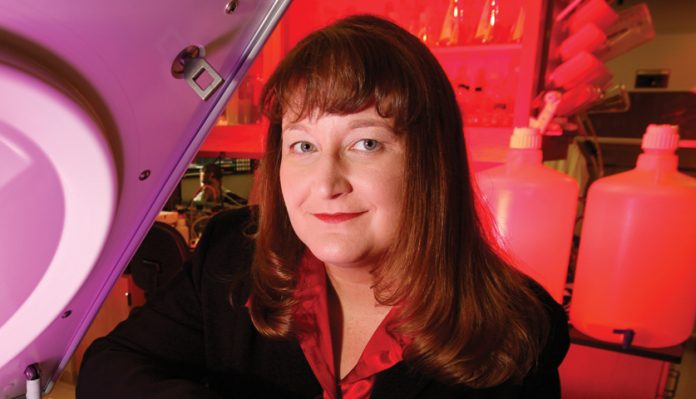A world-renowned lupus expert at the Oklahoma Medical Research Foundation will lead a study aimed at detecting the disease sooner and preventing the resulting damage.
OMRF is accepting study volunteers for the Autoimmune Drivers and Protectants (ADAPTS) study, which is funded through a $6.4 million grant from the National Institutes of Health, said OMRF Executive Vice President and Chief Medical Officer Judith James, M.D., Ph.D.
James’ team is seeking volunteers at high risk of developing systemic lupus erythematosus, or SLE, because of a family history or a positive autoantibody test.
“Some people have blood markers for lupus but never get sick,” said James, who is a member of the National Academy of Medicine. “Others have the markers and develop some symptoms but never get the full-blown disease, while in others, it ravages the body. We want to better understand why and ideally how to prevent the transitions.”
Lupus is an autoimmune disease in which the immune system becomes unbalanced and attacks the body’s own tissues. It can result in damage to the joints, skin, kidneys, heart and lungs and is a leading medical cause of death among women of childbearing age. Although only about 400,000 individuals in the U.S. have the most severe form of the disease, perhaps up to 1 in 10 individuals will have blood markers that look like lupus.
The cause of lupus is unknown, but studies have identified links to genes, immune and inflammatory influences and exposure to environmental factors.
James, who leads OMRF’s Arthritis and Clinical Immunology Research Program and holds the Lou C. Kerr Endowed Chair in Biomedical Research at OMRF, will collaborate with scientists and clinicians from Vanderbilt University and New York University.
“Finding people at high risk of developing lupus before they get sick is a challenge,” James said. “It will require a team approach, using the expertise and the patient samples that each of our three institutions brings.”
Jill Buyon, M.D., director of the NYU Langone Health Lupus Center, will provide samples from study volunteers who, despite being asymptomatic, receive what Buyon called “a double-whammy” diagnosis during pregnancy: they have autoantibodies found in people who have lupus, and these autoantibodies have caused their infants to have lifelong heart damage.
Some of these mothers ultimately develop severe lupus or another autoimmune disorder called Sjögren’s disease, while others develop only mild symptoms or none at all, Buyon said.
“If we can unlock the secrets of what makes someone progress from benign autoimmunity to clinical autoimmunity, that would be revolutionary,” she said. “Then we could tell a woman, ‘You have these factors, so we might want to put you on preventive therapy,’ and in others, we could avoid putting them on medicine unnecessarily.”
By analyzing thousands of patient samples, James said she hopes to discover genetic or environmental protections against lupus.
To volunteer for the study or receive more information, call 405-271-7221. OMRF will enroll individuals for autoantibody testing and potential follow-up into the Oklahoma Cohort of Rheumatic Diseases, a collection of tens of thousands of blood, urine, saliva and tissue samples donated since 2001 by patients in OMRF’s Rheumatology Center of Excellence.















